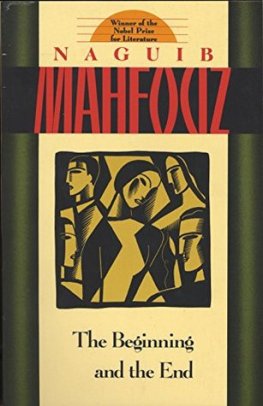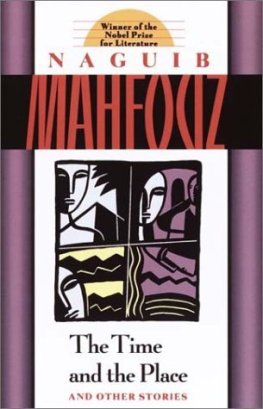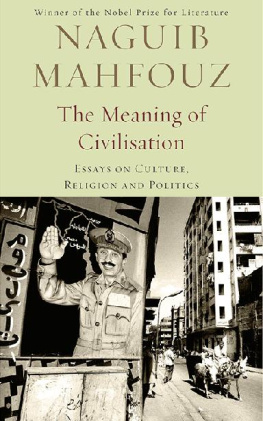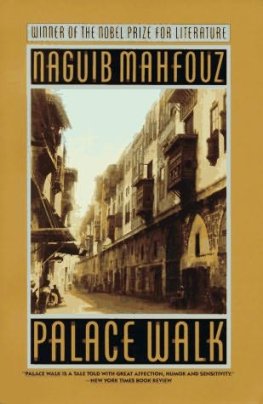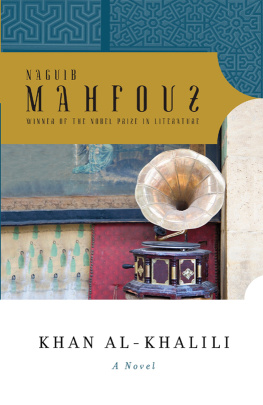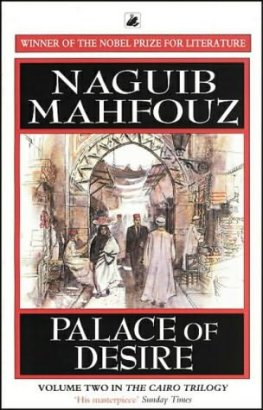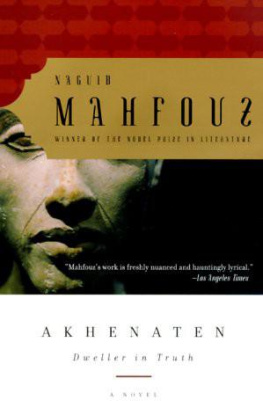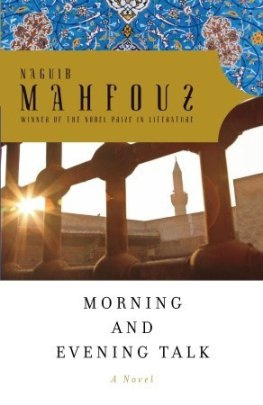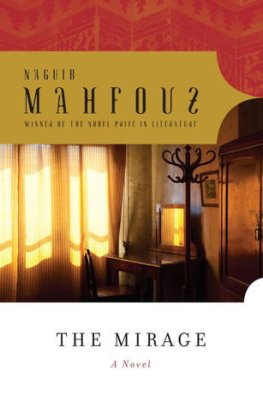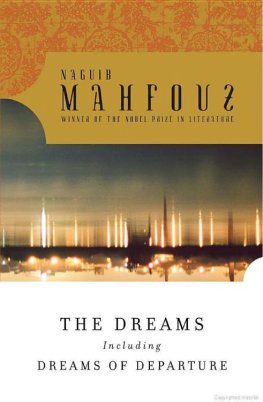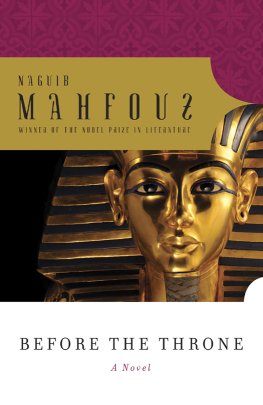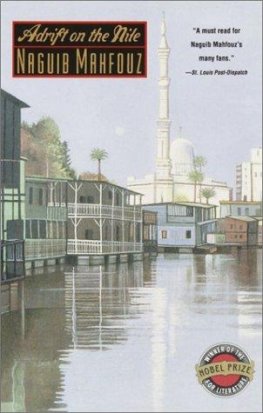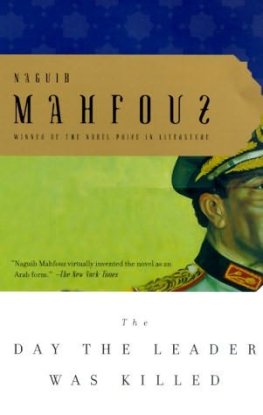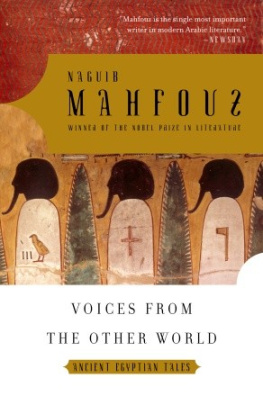Naguib Mahfouz - The Beginning and the End
Here you can read online Naguib Mahfouz - The Beginning and the End full text of the book (entire story) in english for free. Download pdf and epub, get meaning, cover and reviews about this ebook. year: 2016, publisher: Anchor Books, genre: Prose. Description of the work, (preface) as well as reviews are available. Best literature library LitArk.com created for fans of good reading and offers a wide selection of genres:
Romance novel
Science fiction
Adventure
Detective
Science
History
Home and family
Prose
Art
Politics
Computer
Non-fiction
Religion
Business
Children
Humor
Choose a favorite category and find really read worthwhile books. Enjoy immersion in the world of imagination, feel the emotions of the characters or learn something new for yourself, make an fascinating discovery.
- Book:The Beginning and the End
- Author:
- Publisher:Anchor Books
- Genre:
- Year:2016
- Rating:5 / 5
- Favourites:Add to favourites
- Your mark:
- 100
- 1
- 2
- 3
- 4
- 5
The Beginning and the End: summary, description and annotation
We offer to read an annotation, description, summary or preface (depends on what the author of the book "The Beginning and the End" wrote himself). If you haven't found the necessary information about the book — write in the comments, we will try to find it.
The Beginning and the End — read online for free the complete book (whole text) full work
Below is the text of the book, divided by pages. System saving the place of the last page read, allows you to conveniently read the book "The Beginning and the End" online for free, without having to search again every time where you left off. Put a bookmark, and you can go to the page where you finished reading at any time.
Font size:
Interval:
Bookmark:
Naguib Mahfouz
The Beginning and the End
INTRODUCTION
Naguib Mahfouz was born in 1911 in Gamaliyya, an old quarter of Cairo, which was the setting for several of his novels, to a family which earned its living from trade. When he was six years old his family moved to Abbasiyya, then at the outskirts of the capital.
Mahfouzs writings clearly reflect the deep concern of the Egyptian petite bourgeoisie with material security, its worry about the morrow, its conformity to the system, and its disinclination to challenge the authorities or the powers that be. The sole preoccupation of this class was, and perhaps still is, security.
In 1930 Mahfouz entered the Secular University in Cairo, where he studied philosophy. It was his desire to give up this field to study the Arabic language, with which he was infatuated, but since this proved to be impossible, he accepted his academic lot and obtained a B.A. in philosophy in 1934. Then he registered for the masters program in philosophy, the proposed title of his thesis being The Concept of Beauty in Islamic Philosophy.
Almost all of his readings as a graduate student were in philosophy. His readings in literature were meager. This early concern with philosophy led him to contribute a number of essays to the field, such as The Evolution of Social Phenomena, What Is Philosophy? Bergsons Philosophy, Perception and the Senses, The Decline of Some Beliefs and the Emergence of Others, Pragmatism, and Old and New Trends in Psychology. Slim as his readings in literature at that time were, the choice of aesthetics as the topic for his unfinished thesis (perhaps never embarked on) is evidence of his long-standing love for the arts.
With his awakening to literature in the late thirties, Mahfouz turned to Arab as well as Western literary masterpieces. He was greatly influenced by the works of Taha Hussein, Abbas al-Akkad, and Salama Mousa, and openly acknowledges this influence. Mahfouz says that he learned the meaning of intellectual revolt from Taha Hussein, and acquired a belief in the value of the arts, democracy, and individual liberty from Akkad. In Akkads Sarah, he also found an Arabic prototype of the psychological novel. From Salama Mousa, Mahfouz gained an awareness of the value of science, socialism, and intellectual tolerance, and the opportunity to publish many of his articles in The New Magazine.
When Mahfouz appeared on the literary scene, the Arabic novel was still a new genre, received from his predecessors in a crude form that only vaguely foretold the changes it would undergo as Mahfouz and his contemporaries transformed it into a highly developed art form. In order to develop their talents, however, he and the other novelists of his generation felt they needed to become acquainted with the fictional heritage and techniques of the West.
Mahfouz read widely in the literature of the West, reading world literature either in English or in Arabic translations. On the whole, he found it much easier to read the moderns the difficulties of the foreign languages of earlier periods stood between him and the classics. He is conscious of this limitation and the resulting gap in his readings: as he ruefully points out, instead of going directly to the masters, he has learned at the hands of their disciples. He regrets that he has never read Dickens or Balzac, both precursors of the realistic novel for which Mahfouz himself is noted; instead, he discovered realism in the works of such authors as Huxley, Lawrence, Galsworthy, and Flaubert.
His favorites in Russian literature were Tolstoy, Dostoyevsky, Turgenev, and Chekhov; in German literature, Thomas Mann, Goethe, and Kafka. Of French literature he read Anatole France, Flaubert, Proust, Malraux, Mauriac, Sartre, and Camus; of English, Shakespeare, Wells, Shaw, Joyce, Huxley, and Lawrence; of American, Hemingway, Faulkner, Dos Passos, ONeill, Tennessee Williams, and Arthur Miller. Much as he has gained from the work of these authors, none of them has visibly affected his own fiction, which remains unmistakably Egyptian, a clear testimony to his uniqueness and originality.
When Mahfouz started his novelistic career Egypt was undergoing a period of political unrest, suppression, and despotism. In June 1930 the notorious despot Ismail Sidki became Prime Minister. He suspended the 1923 constitution under the pretext that Egypt was not yet ready for a Western-style democracy. Silencing all opposition, he brutally crushed any attempt at questioning his authority. A ferocious and merciless attack was launched against Taha Hussein for daring to voice and publish some skeptical views about pre-Islamic poetry, and he was accused of being a heretic and a disciple of the devil. The tumult ended with his expulsion as dean of the Faculty of Arts. Akkads fate was no better: he landed in prison on the charge that he had abused the royal family.
In this repressive atmosphere, Mahfouz acquired a serpentine wisdom which he has never lost. Realizing, like his predecessor Tawfik al-Hakim, the futility of open rebellion against the autocracy of the ruler, he managed to devise a narrative method that would imply criticism of the system without jeopardizing his interests or running the risk of antagonizing the authorities. As the painful lessons of the early thirties sank into his mind, the wary Mahfouz veiled in his historical fiction his criticism of contemporary Egypt, whose plight he blamed on three sources: despotic monarchy, imperialism, and the servants of imperialism. In three historical novels set in ancient Egypt, The Mockery of Fate (1939), Radobais (1943), and The Struggle of Thebes (1944), he mixed history with symbols, projecting his political sentiments into the events of pharaonic history.
In the later forties and fifties, Mahfouz began employing a more realistic style, with modern Egypt as his setting. Between 1956 and 1957, he produced his famous trilogy, consisting of Bayn al-Qasrayn, Qasr al-Shawq, and al-Sukkariyya, in which he depicted the vicissitudes of fate which swept up three generations of a Cairene family from the 1920s up to the Second World War. To this phase also belong The Beginning and the End (written in 194243 and published in 1949), The New Cairo (1945), Khan el-Khalili (1946), and Midaq Alley (1947). The Beginning and the End is a masterpiece of human compassion. So striking is its humanitarianism and sensitivity to human suffering that its tragic vision of life transcends the Egyptian locale and assumes universal significance. It reflects with sympathy and well-balanced pathos the material, moral, and spiritual problems of an Egyptian petit bourgeois family confronted with poverty during the Second World War.
A versatile and prolific writer, Mahfouz published a number of other novels, including Awlad Haritna (1959, published in English as The Children of Gebelawi), an allegorical novel with metaphysical implications that deals with mans quest and thirst for religious faith. In the 1960s, Mahfouz returned to his fictional preserve, the social novel, experimenting now with more impressionistic, psychological styles. In 1961 he published The Thief and the Dogs, this time mixing social and political realism with the stream-of-consciousness technique, new to the Arabic novel. Again, the quest for the mystical and spiritual is to be found in his novels The Beggar (1965) and Chitchat on the Nile (1966).
The importance of Mahfouzs work as social and political commentary is well described by M. M. Badawi in an article written for The Egyptian Bulletin in June 1982:
The destinies of the individual characters are the microcosm, but the macrocosm is the destiny of modern Egypt. The tragedies, the poignant sufferings, the conflicts of the numerous men and women who people these novels reflect the larger social, intellectual, and political changes in one significant part of the modern Arab world. The struggle of the younger generation of men and women to attain their domestic freedom to shape their own lives mirrors or parallels the nations struggle to achieve political independence and to free itself from the shackles of outworn and debilitating, almost medieval, conventions and world outlook in a gigantic endeavor to belong to the modern world.
Font size:
Interval:
Bookmark:
Similar books «The Beginning and the End»
Look at similar books to The Beginning and the End. We have selected literature similar in name and meaning in the hope of providing readers with more options to find new, interesting, not yet read works.
Discussion, reviews of the book The Beginning and the End and just readers' own opinions. Leave your comments, write what you think about the work, its meaning or the main characters. Specify what exactly you liked and what you didn't like, and why you think so.

